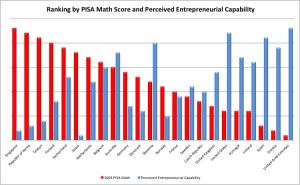
Students from the Oasis Skateboard Factory ‘alternative’ school develop future-needed enterprise skills
There was an interesting article in yesterday’s Wall St Journal. The author, Amanda Ripley, was reporting on the huge private tutoring market in South Korea. Parents in that country now spend an astonishing $17bn, annually, on after-school coaching (increasingly delivered online).
This got me thinking about the education Olympics that is PISA, and the phrase regularly used by our Australian colleagues, ‘an education worth having’. I like it because it makes you think about some fundamental issues around the purpose and value of national education systems. What actually constitutes an education worth having?
Is it, as most politicians seem to argue, to be judged by international rankings in PISA and TIMMS? If so, then the case of South Korea (and other jurisdictions in the region, like Singapore, Shanghai and Hong Kong) raises the issue of efficiency: if parents have to contribute $17bn, and kids have to do twice as much work, as their international competitors, in order to achieve marginal gains over countries like New Zealand, Finland and Canada, is that an efficient education system?
Not only that, is an education system which daily drives kids to the point of exhaustion, and piles psychological stress upon them, simply to get their test scores up, actually worth having?
Even South Korea’s own ex-minister for education, Byong man Ahn, cast doubt on the usefulness of a high PISA ranking, despite Korean students ranking first in reading and math, and third in science, in the 2009 PISA survey:
“While Korea’s students excel at learning, they believe its purpose lies not in self-development based on personal interest or motivation, but in entrance into a highly ranked university. Students have no time to ponder the fundamental question of “What do I need to learn, and why?” They simply need to prepare for the test by learning the most-effective methods for digesting tremendous quantities of material and committing more to memory than others do.”
The news this week, that applications to UK universities has fallen for the first time this year, is perhaps the first sign that middle class parents are realising that paying at least £27,000 for their daughter’s degree isn’t going to be the golden ticket it used to be. Indeed, given the continuing austerity, it’s more likely that the most valued education characteristic should be cultivating a sense of enterprise in students. Yong Zhao in his brilliant new book World Class Learners: Educating Creative and Entrepreneurial Students, points to the almost inverse correlation between perceived entrepreneurial capability and performance in PISA Math tests.The most entrepreneurial countries – United Arab Emirates, United States, Spain, Slovenia, Ireland – aren’t exactly known for their stellar performances in PISA.
So perhaps an education worth having needs to be driven less by numbers and more by attitudes, dispositions and values? Unless governments are simply going to abandon their responsibility for education, and leave it to the private sector (a pattern that some would say is increasingly emerging), they have to consider the best return on their investment. In my new book, ‘Open:The Social Movement That’s Changing The World’, I argue that the biggest innovation-blocker that nations face is disengagement. At work, and in school the numbers are the same: shockingly, less than one-third of us would describe ourselves as ‘engaged’.
Since there’s an irrefutable link between engaged employees, innovation and productivity, I’d suggest that an education worth having should be less concerned about how our kids do in PISA tests, and more focused on their capacity to think critically and creatively, become confident, self-determined and entrepreneurial citizens, and be engaged learners for the rest of their studies and their working lives.
Where are the markers for those qualities?




I simply couldn’t agree more with the last paragraph.
We need to move away from the concept of education being the single source of learning or the way in which learning is managed. What needs to happen is for learners to manage their learning environment to meet their learning needs. Although a simple statement it is both powerful and complex. Simple in that it becomes the responsibility of the learner to understand and meet their learning needs and complex because of the environmental conditions imposed on them and the complex set of relationships that are involved. I have developed a concept I call “LQ” standing for learning quotient or learning intelligence. Those people who do well manage their environment to meet their needs, it is the same in learning. I have begun to write about the concept in detail on my blog and the link for those who want to find out more starts here although there are now nine articles and I will be publishing one each week. http://4c3d.wordpress.com/2013/08/11/learning-quotient/
The latest article looks at LQ and the link to creativity.
Kev